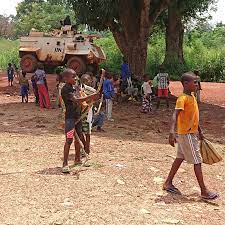The Central African Republic (CAR) is currently facing a dire humanitarian crisis that requires immediate attention. With over half of its population, totaling 3.4 million people, in desperate need of assistance and protection, the CAR’s struggle for survival is reaching a critical point. Highlighting the severity of the situation, Mohamed Ag Ayoya, the UN Humanitarian Coordinator in the CAR, stressed that 2.4 million individuals are confronting severe and complex challenges that put their lives and well-being at risk.
The CAR’s predicament is compounded by the ongoing conflict in neighboring Sudan, which has further intensified the needs of the country. Recognizing the urgency, a $465 million humanitarian plan has been revised to include support for approximately 25,000 Sudanese and CAR nationals who have been displaced by the fighting, as well as the local communities that have offered them refuge.
Displacement, floods, and underdevelopment have created a perfect storm of hardship in the CAR. The frequent clashes between armed groups have compelled one out of every five people to flee their homes, seeking shelter within the country or across the border. Moreover, devastating floods last year affected over 100,000 individuals and led to the destruction of more than 6,000 homes. Years of inadequate investment in socio-economic infrastructure, services, and livelihoods have made basic necessities inaccessible to a significant portion of the population, exacerbating their living conditions and eroding their resilience.
The consequences of these challenges are dire. Three out of five citizens lack access to safe drinking water and sanitation, while only 55% of children are able to complete elementary school. Gender-based violence has taken a devastating toll, with two women or girls falling victim every hour. In the first quarter of this year alone, nearly 5,000 cases have been reported.
Adding to the challenges, the CAR is also grappling with the aftermath of the COVID-19 pandemic and the repercussions of the Russian invasion of Ukraine, which have strained resources and increased vulnerabilities. The arrival of approximately 14,000 Sudanese asylum seekers and repatriates from the CAR’s northeast has further strained limited resources, while the suspension of commercial traffic across the border has disrupted essential supply chains.
Delivering humanitarian aid in the CAR is a race against time, compounded by a volatile security situation. During the rainy season, large parts of the country become inaccessible by road, necessitating air lifts for aid delivery. Furthermore, the precarious security environment means that an aid worker experiences violence or security incidents approximately every second day since 2022.
Despite these immense challenges, humanitarian partners are tirelessly working to support vulnerable communities. In 2022, they reached nearly two million people, surpassing 90% of their target, and in the first three months of this year alone, they assisted 658,000 individuals. Quick mobilization and prepositioning of emergency supplies have been crucial in effectively responding to crises.
To address the evolving needs, an addendum to the 2023 Humanitarian Response Plan for the CAR has been developed. This addendum outlines the additional budgetary requirements of $69 million to assist approximately 25,000 people fleeing the conflict, including both Sudanese citizens and returning CAR nationals, as well as approximately 25,000 members of the host communities.





